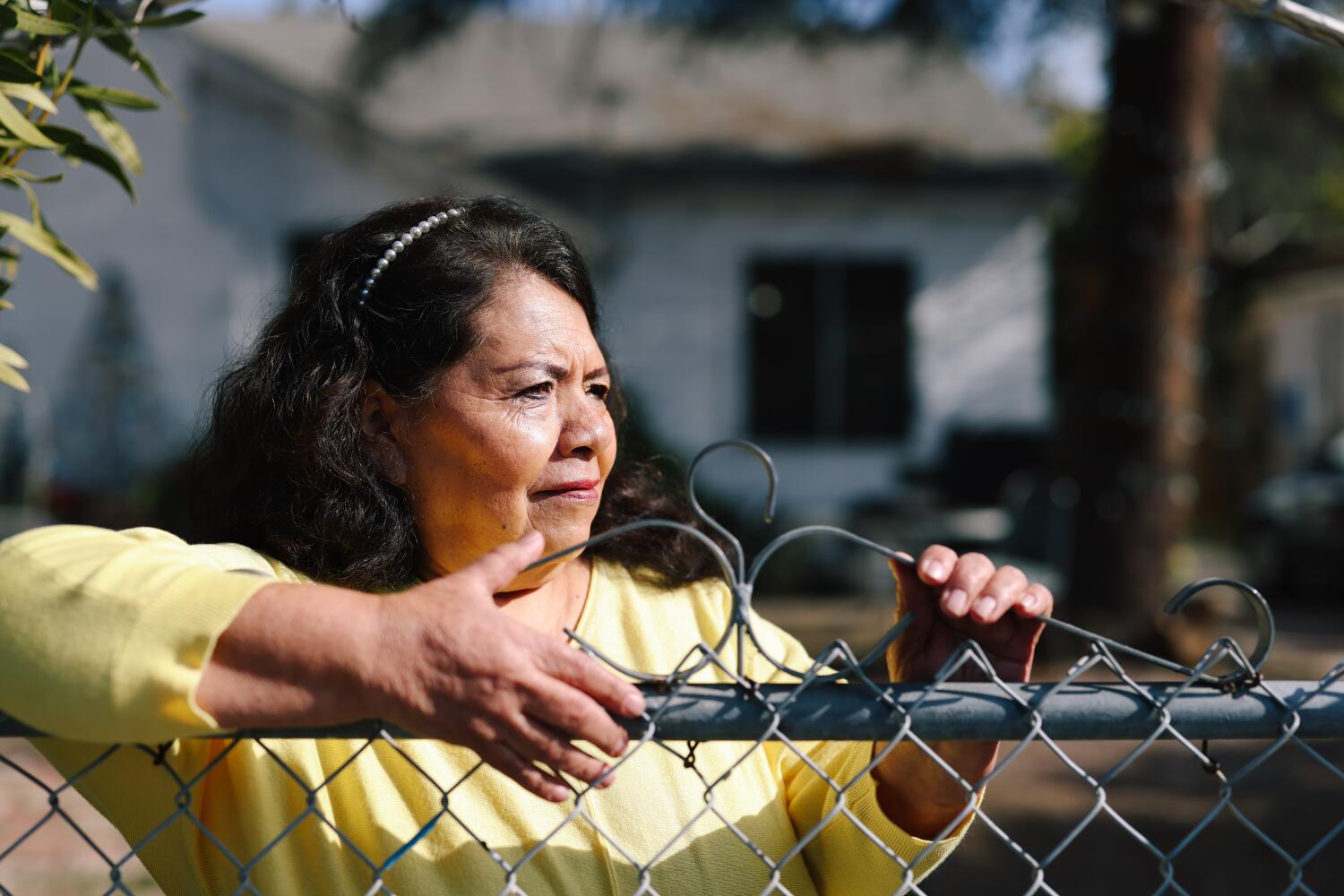

In 2022, not long after a new owner bought the Highland Park rental home where Ana Lopez, 66, lives with her husband, the tenants began receiving offers to leave. At first it was about $22,000, she said. One of her neighbors took the offer and left. But Lopez, desperate to stay in the rent-controlled home where she has lived for more than two decades and pays $800 a month, repeatedly turned down the offers, even when the amount increased to $100,000.
After taxes, she felt, the money was not enough to remain long-term in her community, where the average monthly rent is more than $2,000 and the median sale price of a home is more than $1 million.
She’s felt pressured to go and has been informed that the owner plans to demolish the property. But, she says, “We’re going to keep fighting to stay in our home.”
Buyout offers — also known as “cash for keys” — have become a frequently used tool for landlords hoping to get tenants to leave rent-controlled apartments without going through a formal eviction process, which can take time, be costly and is governed by strict rules. But it has been difficult to say exactly how often renter buyouts happen across Los Angeles. Last week, data released by City Controller Kenneth Mejia’s office shed some light on the subject, showing that from 2019-23 nearly 5,000 “cash for keys” agreements were filed with the city.
Neighborhoods in Koreatown, Echo Park and Mid-Wilshire topped the list for the number of agreements. Lopez’s Highland Park neighborhood was also among the top ZIP codes.
In a statement, Mejia’s office said “tenant buyouts are a tactic that landlords use to compel tenants to move out of RSO (Rent Stabilization Ordinance) units or rent-controlled units, often so landlords can re-rent these units to new tenants at market-rate prices. In many cases, buyout amounts are not enough for tenants to afford continuing to live in the City of Los Angeles long term.”
Tenant advocates say the numbers reported to the city fall short of fully capturing the extent to which cash for keys is happening across the city. They note that the data include only agreements — not the offers, which often happen informally with a person knocking on the door or making a phone call. Even the agreements themselves, advocates say, may not end up being filed with the city.
“The number of such notices filed with LAHD is likely a tiny fraction of such agreements,” said Gary Blasi, professor of law emeritus at UCLA School of Law.
Landlords say the buyout agreements can be a useful tool, giving tenants an incentive to move and creating a win-win for owners, who get their units back, and renters, who leave with some money to help pay for housing going forward. The average amount of a buyout, according to the data was $24,704.
But tenant advocates say even that amount — or more — is often not enough to allow low-income families to continue living in L.A. neighborhoods where the cost of housing has soared in recent years, especially after taxes.
“When it comes as a lump sum you think, ‘That’s a lot of money’ but you also need to know what it’s going to cost you to stay housed on the open market,” Blasi said. “What looks to be like a big lump sum windfall could actually leave the tenant in a much worse situation than they are.”
Tenants and advocates also say that people who turn down the offers are often met with harassment by landlords.
“We’ve had tenants report that people come by their home every day at dinner banging on the door telling them they really should take the offer, or people who come by really late at night,” said Cynthia Strathmann, executive director for the nonprofit advocacy group Strategic Actions for a Just Economy. “And there’s other kinds of harassment, persistent neglect — a landlord will refuse to fix anything in the apartment and then really insistently offer them cash for keys until the pressure of living in an apartment that’s really in terrible condition will prompt the tenant to move.”
Strathmann said communities at the top of the controller’s list, like Koreatown and Echo Park, are ones where there’s an especially big difference between the monthly rent paid by a long-term tenant in a rent-controlled unit and what a landlord could command on the current market.
Chris Gray, president of the property management company Moss & Co., said cash for keys agreements became especially important tools for landlords after the pandemic, when many tenants racked up large amounts of unpaid rent debt.
“Landlords are in a tough position and all they want to do is get someone into their unit to pay rent,” he said.
An eviction through the courts can take months and cost tens of thousands of dollars in attorney fees, Gray noted.
“When you look at a whole picture like that, a landlord would be happy to forgive past rent debt of $30,000, $40,000, or whatever it may be, to get them out and avoid the whole eviction process.”
The city began regulating buyout agreements and collecting information about them in 2017 after tenant advocates began protesting what they saw as an increasing practice of property owners displacing residents of rent-controlled units without fully informing them of their rights.
The Tenant Buyout Notification Program requires landlords to provide information to renters when making a buyout offer. They must inform tenants that they are entitled to minimum compensation, which ranges from $9,900 to $24,650, depending on various factors including how long the tenant has lived in the home and whether they are elderly or disabled. Tenants are also told that they have the right to refuse or rescind the offer and to consult with an attorney or the housing department.
Under the program, landlords are also required to file any agreements with the L.A. housing department. Those filings are the basis for the analysis that was released by the controller’s office.
According to the data, buyout filings peaked in 2019, when there were 1,209 agreements. Last year there were 789 agreements filed with the city.
The buyout ordinance allows tenants to “bring a private right of action against a landlord who violates” the rules and to recover damages and a penalty of $500. But that’s a step many low-income residents are unlikely to take, Blasi said.
“I think the city should look again at the tenant buyout notification program and look to put some teeth into it and do some serious outreach to tenants and landlords about the existence of it,” Blasi said. “That can only help everybody who is operating in good faith.”
